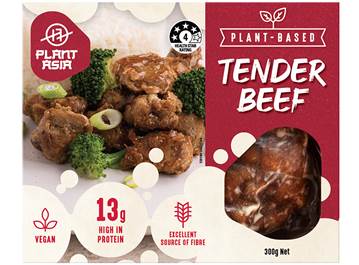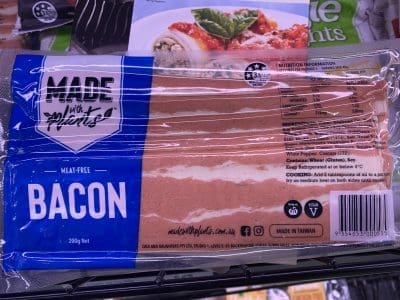
TWO Government bodies have weighed in with submissions to the “Definitions of Meat” Senate inquiry, putting forward positions that contrast with meat industry views that non-meat protein products should not be able to be sold under meat labels in Australia.
The Senate Rural and Regional Affairs and Transport Committee has launched an inquiry into the ‘Definitions of meat and other animal products” in response to meat sector concerns that current labelling rules allow non-meat products to unfairly “piggyback” off the reputation of, and decades of investment by, meat producers and industry stakeholders, and allow non-meat products to be sold in a misleading way.
A total of 19 submissions had been published on the inquiry homepage by this morning.
The deadline for submissions remains open until August 13.
In its submission the Australian Competition and Consumer Commission said it has seen no evidence to date to suggest that plant-based protein products which use animal related descriptors or animal images in their labels warrants compliance or enforcement action under Australian Consumer Law.
“In each case we considered that a court would view the overall impression conveyed by the labelling of these products as unlikely to mislead an ordinary consumer”, the submission states.
The ACCC submission was signed by deputy chair Mick Keogh.
Red meat industry groups have noted significant differences between the position put forward on the issue by the ACCC in its submission and earlier comments Mr Keogh made when he was the executive director of the Australian Farm Institute.
In that capacity in 2018 Mr Keogh wrote in an AFI blog that “the use of the term ‘meat’ to describe chemically reconstituted artificial protein is not only misleading but is also an attempt to appropriate the value that consumers attribute to products referred to as meat – and are prepared to pay for – to create a market for these new products.”
Asked if Mr Keogh could shed further light on why his position on the issue appeared to have changed so significantly between his 2018 comments and the ACCC submission, an ACCC spokesperson said the ACCC submission was written specifically through the filter of Australian consumer law.
“The ACCC’s submission to the senate inquiry looked at labelling of plant-based substitute products through the lens of the Australian Consumer Law, which amongst other things, prohibits businesses from engaging in conduct that is misleading or deceptive. These terms have a specific legal meaning which may differ from the way the terms may be used in general usage,” the ACCC spokesperson said in a statement to Beef Central.
“The ACCC considers the potential detriment of any alleged misleading or deceptive conduct in determining whether to take any compliance or enforcement action, in line with our Compliance and Enforcement Policy.
“Following close examination of a number of plant-based substitute products to date, the ACCC hasn’t yet identified any that warranted compliance or enforcement action.
“We will continue to consider allegations raised with us about misleading labelling of plant-based substitute products under the Australian Consumer Law.”
FSANZ – when is a sausage really a sausage?
In another submission Government agency Food Standards Australia New Zealand (FSANZ) draws specific attention to a section of the Food Standards Code that (section 1.1.1—13) which states that certain foods sold with a specified name or representation must satisfy “compositional requirements”.
For meat and meat products the code defines these foods as sausage, meat pie, dried meat, cured and/or dried meat flesh in whole cuts or pieces, manufactured meat or processed meat.
FSANZ’s submission further notes that the compositional requirements include the requirement that “the product contains meat”: “In this regard, the Code defines ‘meat’ to mean meat from animal sources,” the submission states.
While seems to make it clear in black and white that a sausage can only be a sausage if it contains meat from animal sources, an additional qualifying clause introduced to the Code in 2016 means there is more to the story.
This takes the form of Section 1.1.1—13 (4), introduced via a 2016 Food Code amendment first proposed by Sanitarium for dairy products, which says the compositional requirements must be satisfied “unless the context makes clear that this is not the intention”.

An example of a plant-based product being sold under a meat descriptor in a Woolworths supermarket.
As a result, as outlined in the FSANZ submission, the compositional requirements that would require a sausage to be made from meat from animal sources would not apply to non-meat protein products that are labelled as sausages, provided the label provide s additional context such as ‘meat-free sausage’, ‘vegetarian sausage’ or ‘soy sausage’.
“It is clear that such a product is not a sausage containing meat from animal sources. Nor is it being sold or intended to be sold as a sausage of meat from animal sources,” the FSANZ submission states.
“Therefore, compositional requirements in the Code that apply to food sold as a sausage of meat from animal sources do not apply.”
Meat must be meat, but plant based proteins can do ‘whatever they like’
Meat industry representatives have pointed out that the code in effect strictly regulates the composition of meat products, but allows manufactured plant based proteins to do “whatever they like”, as long as they include an alternate descriptor in their labelling.
The FSANZ submission implies that certainty exists around “named” products in the Code.
But that also appears to open the door to a significant grey area around products that are not specifically “named” in the Code and how they should be treated.
While terms such as “sausage”, “pie” or “processed meat products” are named products, “meat” itself is not.
“Section 1.1.1—13 of the Code does not apply to meat/meat products other than those listed above (e.g. minced beef, ribeye steak),” the FSANZ submission states.
“For those foods, the requirement for the name of the food to indicate its true nature applies (subsection 1.2.2—2(1) of the Code). As for all foods, consumer protection legislation also applies.”
The question then arises: how should “meat” be interpreted under the Code? If “meat” is not a named food, does Standard 1.1.1-13(4) (below) apply at all?
Standard 1.1.1-13(4): If a food name is used in connection with the sale of a food (for example in the labelling), the sale is taken to be a sale of the food as the named food unless the context makes it clear that this is not the intention.
(full code can be viewed on FSANZ website here)
The FSANZ submission says that the name of the food stated on the label must be sufficient to indicate the “true nature of the food”, unless the Code requires a prescribed name to be used instead (this from subsection 1.2.2—2(1) of the Code).
Are plant-based proteins that use the terms ‘meat’ or ‘beef’ effectively in breach of this standard, as they do not indicate the true nature of the food?
The Red Meat Advisory Council says further clarity is required from FSANZ on questions such as this and how ‘the true nature of the food’ is interpreted in relation to beef and plant protein products labelled as beef.
In comments to Beef Central this week RMAC chair John McKillop also expressed disappointment with the ACCC submission, stating that fair trading laws and food laws in Australia and New Zealand require that labels do not misinform consumers through false, misleading or deceptive representations.
 “As Executive Director of the Australian Farm Institute, Mr Keogh was right to say using the term meat to describe manufactured plant-based protein products is misleading and attempts to appropriate the value consumers attribute to meat products.
“As Executive Director of the Australian Farm Institute, Mr Keogh was right to say using the term meat to describe manufactured plant-based protein products is misleading and attempts to appropriate the value consumers attribute to meat products.
“At a time of heightened health concerns for many Australians, consumers deserve robust truth in labelling regulations that assure product composition, safety and nutrition.
“Duke University Medical Centre researchers have found manufactured plant-based products are 90 percent metabolically different to grass-fed beef.
“Heavily processed manufactured plant-based proteins made primarily with imported ingredients are not nutritionally the same as naturally raised Australian red meat and our labelling laws must reflect this.”
